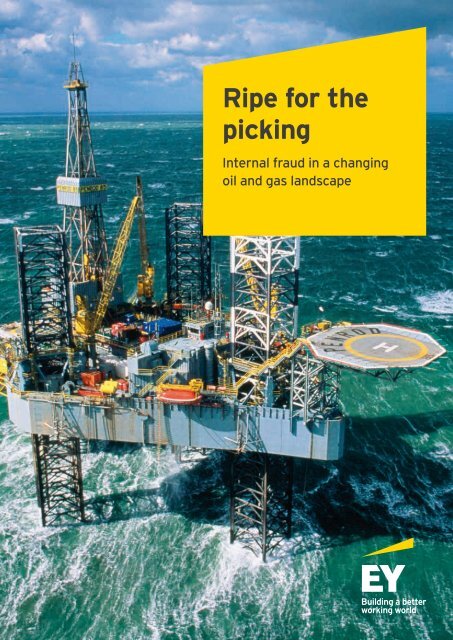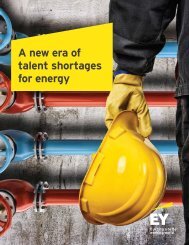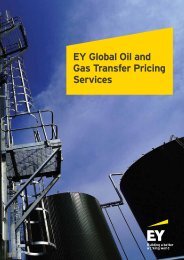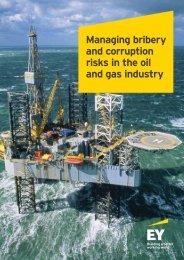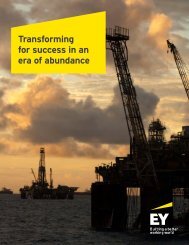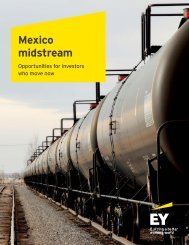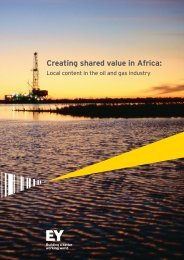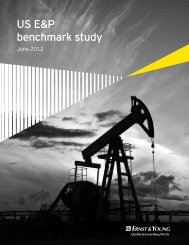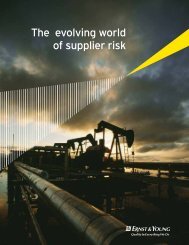Ripe for the picking
60128Raly
60128Raly
Create successful ePaper yourself
Turn your PDF publications into a flip-book with our unique Google optimized e-Paper software.
<strong>Ripe</strong> <strong>for</strong> <strong>the</strong><br />
<strong>picking</strong><br />
Internal fraud in a changing<br />
oil and gas landscape
Volatility in <strong>the</strong> oil and gas market, geopolitical instability,<br />
slow energy demand growth and economic sanctions<br />
have brought new challenges <strong>for</strong> oil and gas companies,<br />
including testing companies’ ability to preserve capital,<br />
reduce spending and withstand sustained pressure on<br />
balance sheets.<br />
1 <strong>Ripe</strong> <strong>for</strong> <strong>the</strong> <strong>picking</strong> A changing oil and gas landscape
The main drivers<br />
Driven by anemic economic growth in Europe and North America,<br />
oil and gas companies continue to invest in emerging markets,<br />
often perceived to be of higher risk <strong>for</strong> bribery and corruption.<br />
While it is good practice <strong>for</strong> companies to build or streng<strong>the</strong>n<br />
compliance programs in higher-risk markets, one must ask how<br />
much attention has been given to perceived low-risk local markets<br />
such as <strong>the</strong> UK?<br />
For example, mergers and acquisitions in <strong>the</strong> North Sea have<br />
created a global marketplace <strong>for</strong> professionals from various<br />
regions of <strong>the</strong> world who have brought in <strong>the</strong>ir own culture and<br />
work practices. This raises new challenges in establishing a<br />
standard in corporate culture.<br />
The current volatility has triggered budget cuts and increased<br />
pressure on <strong>the</strong> cost of doing business across this industry.<br />
Finance, production, sales and operations managers are all under<br />
pressure to continue to deliver results. In some cases, this may<br />
provide a strong incentive to do whatever it takes to make <strong>the</strong><br />
numbers look good. In fact, In our 2016 Global Fraud Survey,<br />
almost half of respondents felt that potentially unethical behavior<br />
was justified in order to meet financial targets.<br />
These factors can heighten a company’s exposure to internal<br />
fraud and misconduct risks in <strong>the</strong> <strong>for</strong>m of corruption, asset<br />
misappropriation or financial misstatement. Corruption and<br />
mis-selling have increasingly become <strong>the</strong> focus of en<strong>for</strong>cement<br />
and regulatory action. However, it is vital that while responding to<br />
<strong>the</strong>se developments, oil and gas companies do not neglect <strong>the</strong>ir<br />
internal fraud controls.<br />
This was made evident in our recent 2016 Global Fraud Survey,<br />
where a third of extractive respondents said <strong>the</strong>y were willing<br />
to act unethically in order to survive an economic downturn,<br />
while a fifth of respondents said that loyalty to <strong>the</strong>ir company<br />
would prevent <strong>the</strong>m from reporting an incident of fraud.<br />
This environment of increased pressure and market instability<br />
exposes oil and gas companies to a greater risk of internal fraud<br />
and misconduct.<br />
The favorite <strong>for</strong>ms of internal fraud<br />
Manipulation of expenses continues to be a high-risk area <strong>for</strong><br />
internal fraud and we will likely see this exacerbated by <strong>the</strong><br />
instability in <strong>the</strong> market. The pressure that companies face to<br />
increase profits with fewer assets and manpower may have<br />
unintended effects on this type of fraud. There may be a greater<br />
risk of employees seeking to replace lost pay increases or<br />
bonuses by embezzling funds through manipulation of expenses,<br />
gifts and hospitality. One recent case saw a <strong>for</strong>mer finance<br />
executive charged <strong>for</strong> allegedly defrauding a North Sea company<br />
of £1 million.<br />
In ano<strong>the</strong>r case, one international oil exploration company has<br />
notified <strong>the</strong> UK Serious Fraud Office (SFO) of dubious expenses<br />
and unauthorized bonuses after being alerted by a whistle-blower.<br />
Initial investigations have led to <strong>the</strong> firing of a number of senior<br />
personnel and compounded <strong>the</strong> collapse in <strong>the</strong> company’s oil price<br />
and subsequent de-listing.<br />
An issue we often observe is billing and procurement fraud.<br />
A payroll officer at an energy company recently defrauded her<br />
employer of £1.3 million over four years by fabricating demands<br />
<strong>for</strong> payment from HMRC and funneling <strong>the</strong> proceeds into her<br />
personal account.<br />
Financial misstatement can also be a high risk area: a North<br />
American exploration and production company oil producer<br />
was accused by <strong>the</strong> SEC of overstating <strong>the</strong> value of oil and<br />
gas properties by more than $400m following acquisition.<br />
The company subsequently agreed to pay <strong>the</strong> SEC $5m to settle<br />
<strong>the</strong> matter with <strong>the</strong> company’s <strong>for</strong>mer CFO and <strong>for</strong>mer COO being<br />
charged with accounting fraud.<br />
<strong>Ripe</strong> <strong>for</strong> <strong>the</strong> <strong>picking</strong> A changing oil and gas landscape<br />
2
Some insights from our 2016<br />
Global Fraud Survey<br />
(Oil, gas and mining)<br />
35%<br />
of<br />
respondents said <strong>the</strong>y were<br />
willing to act unethically to<br />
help a business survive an<br />
economic downturn<br />
43%<br />
felt<br />
that potentially unethical<br />
action could be justified to<br />
meet financial targets<br />
21%<br />
said<br />
that loyalty to <strong>the</strong>ir<br />
company would prevent<br />
<strong>the</strong>m from reporting an<br />
incident of fraud<br />
24%<br />
said<br />
that loyalty to colleagues<br />
would prevent <strong>the</strong>m from<br />
reporting an incident of fraud<br />
3 <strong>Ripe</strong> <strong>for</strong> <strong>the</strong> <strong>picking</strong> A changing oil and gas landscape
Disrupting internal fraud<br />
Using <strong>the</strong> fraud triangle to explain <strong>the</strong> factors that cause someone<br />
to commit fraud, one sees a pattern. In most of <strong>the</strong>se cases, red<br />
flags such as <strong>the</strong> perpetrator living beyond his means, falling into<br />
acute financial difficulties or having unusually close relationships<br />
with customers and vendors were clearly discernible.<br />
Ultimately, <strong>the</strong> risk of fraud can be reduced by taking steps to<br />
disrupt any one or more of <strong>the</strong>se three attributes: rationalization,<br />
opportunity; or pressure. EY regularly supports companies<br />
operating in <strong>the</strong> Oil & Gas sector in developing <strong>the</strong>se<br />
counter-fraud mechanisms.<br />
Fraud model originally developed by Donald R Cressey 1<br />
Culture<br />
Internal<br />
► ► “I need <strong>the</strong> money”<br />
► ► “It is such a small amount<br />
anyway”<br />
► ► “No one will ever know”<br />
Rationalization<br />
Opportunity<br />
►►<br />
Loopholes in internal<br />
systems and controls<br />
Pressure<br />
►►<br />
Keeping up with <strong>the</strong> lifestyle of peers<br />
►►<br />
Debts/addiction<br />
►►<br />
Malice/revenge<br />
1<br />
Donald R. Cressey, O<strong>the</strong>r People’s Money<br />
(Montclair: Patterson Smith, 1973) p. 30.<br />
<strong>Ripe</strong> <strong>for</strong> <strong>the</strong> <strong>picking</strong> A changing oil and gas landscape<br />
4
Practical steps <strong>for</strong> combatting internal fraud<br />
EY can provide companies with practical support in developing successful anti-fraud frameworks.<br />
Employee due diligence<br />
As well as conducting due diligence on key members of staff, corporate integrity methodologies can be<br />
utilized to profile employees’ decision-making processes, allowing organizations to detect weak links<br />
and be alert to any potential breaches.<br />
Internal controls<br />
Process workflow can be examined, modeled and set up to utilize known fraud-deterrents such as bank<br />
reconciliations, IT security audits and process audits.<br />
Forensic reviews<br />
Analyzing data to examine compliance, deviations and red flags is an important tool to detect fraud.<br />
The results can be used to detect fraud retrospectively, as well as to protect against <strong>the</strong>se specific<br />
fraud patterns in future.<br />
Whistle-blowing<br />
Companies need to have clearly defined whistle-blower policies and processes, which ensure that<br />
allegations are investigated and resolved in a timely manner.<br />
Despite this, our recent EMEIA Fraud Survey 2015 has shown that 14% of extractive companies did not<br />
have a whistle-blower hotline, and out of those who do have this in place, less than half said a report<br />
would always be followed up on by senior management.<br />
Investigations<br />
Should fraud occur, companies must have <strong>the</strong> tools and training necessary to quickly investigate,<br />
and if necessary, evidence wrongdoing.<br />
Data analytics<br />
Proactive monitoring through <strong>for</strong>ensic data analytics can be used to detect fraudulent activity early on<br />
and discourage future misconduct.<br />
Underpinning an effective anti-fraud framework is a culture that encourages and nurtures a strong,<br />
sustainable organization, which serves wider society, through cultivating a working environment guided<br />
by values that are shared by everyone.<br />
Cultural integrity<br />
Our 2015 EMEIA Fraud Survey showed that <strong>the</strong> extractive sector still has a long way to go in addressing<br />
cultural integrity. Less than a quarter of respondents rated <strong>the</strong>ir companies’ ethical standards when<br />
doing business as very good, while two-thirds felt that unethical practices may often go unnoticed by<br />
<strong>the</strong> head office. Only 36% of respondents, felt that <strong>the</strong>ir company had improved ethical standards in <strong>the</strong><br />
past year.<br />
5 <strong>Ripe</strong> <strong>for</strong> <strong>the</strong> <strong>picking</strong> A changing oil and gas landscape
Are companies sufficiently aware of <strong>the</strong> risks?<br />
Almost half <strong>the</strong> companies surveyed in <strong>the</strong> National Fraud<br />
Authority report in 2013 said <strong>the</strong>y had been victims of Insider<br />
Fraud. While <strong>the</strong> ACFE’s 2016 Report to <strong>the</strong> Nations found that<br />
oil and gas companies had a similar likelihood of being victims<br />
of fraud, <strong>the</strong>ir financial losses were some of <strong>the</strong> heaviest. Out of<br />
23 industries, oil and gas companies suffered <strong>the</strong> fifth largest<br />
financial losses at an average of $275,000.<br />
Across each of <strong>the</strong> sectors, <strong>the</strong> report found that losses were<br />
estimated to be 5% of company revenue. These losses are usually<br />
not recovered and <strong>the</strong> eventual cost to <strong>the</strong> company can be<br />
up to four times higher, taking in <strong>the</strong> cost of <strong>the</strong> investigation,<br />
disciplinary action, and replacements (CIFAS, April 2014).<br />
The collateral damage to reputation, political and social capital,<br />
loss of productivity, and drop in employee morale amplify <strong>the</strong>se<br />
losses even fur<strong>the</strong>r.<br />
There is also a risk that internal fraud is heavily underreported<br />
due to low whistle-blower activity, tolerance of minor infractions<br />
and a desire to keep <strong>the</strong> firm’s reputation untarnished. Companies<br />
need to re-examine key messages and tolerance levels <strong>for</strong><br />
unethical behavior and misconduct. They <strong>the</strong>n need to adopt<br />
a robust corporate integrity framework and actively engage in<br />
fraud management programs if <strong>the</strong>y want to limit <strong>the</strong>ir exposure to<br />
this risk.<br />
The final word<br />
The current instability in <strong>the</strong> oil and gas market and subsequent<br />
pressures on headcount and budget reductions, means that firms<br />
need to think strategically when identifying efficiencies in <strong>the</strong>ir<br />
counter-fraud programs. Companies operating in this sector<br />
should not view investing in <strong>the</strong>ir counter-fraud framework as a<br />
burden to profitability. An effective counter-fraud program must<br />
be seen as a requirement to securing a sustainable success take<br />
over in <strong>the</strong> current marketplace.<br />
Successfully combating internal fraud will require firms to take a<br />
multi-faceted approach, integrating <strong>the</strong> expertise of <strong>the</strong>ir business,<br />
compliance, internal audit and risk functions. It means developing<br />
<strong>the</strong> tools, processes and systems to allow firms to monitor, detect<br />
and investigate promptly when something appears out of place.<br />
Firms that exploit new developments in <strong>for</strong>ensic data analytics,<br />
may be able to create greater efficiencies in <strong>the</strong> long run.<br />
However, countering fraud is a wider question than merely early<br />
detection. It begins with organizational culture, continues through<br />
internal processes and culminates in <strong>the</strong> way that breaches are<br />
investigated and resolved.<br />
Given <strong>the</strong> volatility currently faced by oil and gas firms, it is now<br />
more important than ever <strong>for</strong> firms to prioritize implementing<br />
effective internal fraud controls.<br />
<strong>Ripe</strong> <strong>for</strong> <strong>the</strong> <strong>picking</strong> A changing oil and gas landscape<br />
6
EY Fraud Investigation & Dispute<br />
Service contacts<br />
Find out how we can help you protect <strong>the</strong> financial and<br />
reputational value of your business. We will react quickly and<br />
efficiently to prevent, detect and resolve any threats you face,<br />
however complex.<br />
Jim McCurry<br />
EMEIA and Nor<strong>the</strong>rn Europe leader<br />
Tel: + 44 20 7951 5386<br />
Email: jmccurry@uk.ey.com<br />
Stefan Heissner<br />
Central and Eastern Europe<br />
Tel: + 49 211 9352 11397<br />
Email: stefan.heissner@de.ey.com<br />
Ricardo Norena<br />
Western Europe<br />
Tel: + 34 91 572 5097<br />
Email: ricardo.norenaharrera@es.ey.com<br />
Michael Adlem<br />
Middle East<br />
Tel: + 971 4701 0524<br />
Email: michael.adlem@ae.ey.com<br />
Arpinder Singh<br />
India<br />
Tel: + 91 22 6192 0160<br />
Email: arpinder.singh@in.ey.com<br />
EY | Assurance | Tax | Transactions | Advisory<br />
About EY<br />
EY is a global leader in assurance, tax, transaction and<br />
advisory services. The insights and quality services we deliver help<br />
build trust and confidence in <strong>the</strong> capital markets and in economies <strong>the</strong><br />
world over. We develop outstanding leaders who team to deliver on our<br />
promises to all of our stakeholders. In so doing, we play a critical role in<br />
building a better working world <strong>for</strong> our people, <strong>for</strong> our clients and <strong>for</strong><br />
our communities.<br />
EY refers to <strong>the</strong> global organization, and may refer to one or more, of<br />
<strong>the</strong> member firms of Ernst & Young Global Limited, each of which is<br />
a separate legal entity. Ernst & Young Global Limited, a UK company<br />
limited by guarantee, does not provide services to clients. For more<br />
in<strong>for</strong>mation about our organization, please visit ey.com.<br />
About EY’s Fraud Investigation & Dispute Services<br />
Dealing with complex issues of fraud, regulatory compliance and<br />
business disputes can detract from ef<strong>for</strong>ts to succeed. Better<br />
management of fraud risk and compliance exposure is a critical business<br />
priority — no matter <strong>the</strong> size or industry sector. With over 4,500 fraud<br />
investigation and dispute professionals around <strong>the</strong> world, we will<br />
assemble <strong>the</strong> right multidisciplinary and culturally aligned team to work<br />
with you and your legal advisors. We work to give you <strong>the</strong> benefit of our<br />
broad sector experience, our deep subject matter knowledge and <strong>the</strong><br />
latest insights from our work worldwide.<br />
© 2016 EYGM Limited.<br />
All Rights Reserved.<br />
EYG no. 03430-164GBL<br />
EY-000005386.indd (UK) 10/16.<br />
Artwork by Creative Services Group Design.<br />
ED None<br />
This material has been prepared <strong>for</strong> general in<strong>for</strong>mational purposes only and is not intended to<br />
be relied upon as accounting, tax, or o<strong>the</strong>r professional advice. Please refer to your advisors <strong>for</strong><br />
specific advice.<br />
ey.com/oilandgas<br />
Sharon Van Rooyen<br />
Africa<br />
Tel: + 27 11 772 3150<br />
Email: sharon.vanrooyen@za.ey.com<br />
Brian Loughman<br />
Americas leader<br />
Tel: + 1 212 773 5343<br />
Email: Brian.Loughman@ey.com<br />
Chris Fordham<br />
Asia Pacific<br />
Tel: + 85 22 846 9008<br />
Email: chris.<strong>for</strong>dham@hk.ey.com<br />
Ken Arahari<br />
Japan<br />
Tel: +81 3 3503 2510<br />
Email: arahari-kn@shinnihon.or.jp


